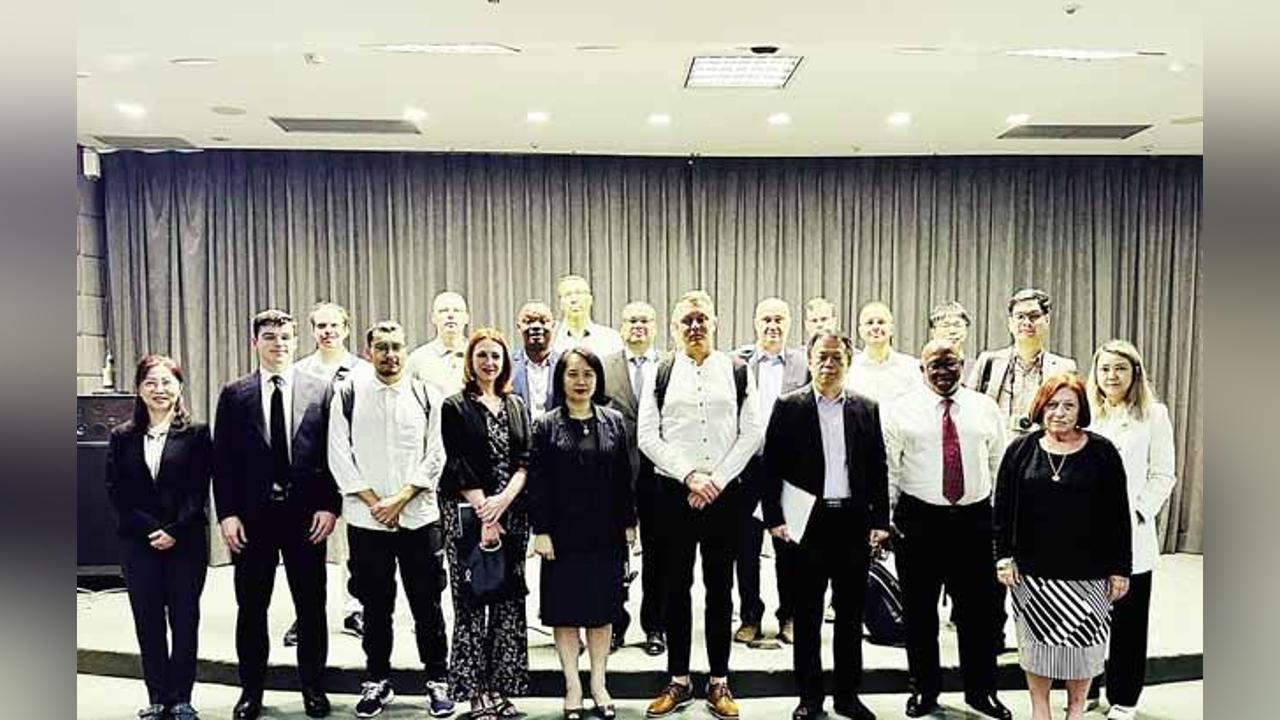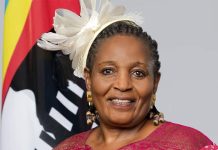Africa-Press – Eswatini. Although a good day’s flight (and a half) away, once in Taiwan, this place does tend to feel like home.
That’s how special the people of Taiwan have gone out of their way to make Eswatini nationals feel welcome to their country – for all that the bilaterals bring to the table.
The relationship between the two countries is something Taiwan treasures, said the charismatic minister of foreign affairs during his presentation during the political conference hosted by the ministry, a programme put together to showcase the country’s growth and development despite the challenges posed by the strained relations with China.
As a result of the ‘One-China’ policy, Taiwan has been alienated by the United Nations and most of the countries who have sided with China, which in itself makes Eswatini become a remarkably good friend for the 23 million people of Taiwan for its stand with their country in calling for its acceptance to the UN family.
Eswatini now remains the only African nation that enjoys diplomatic ties with Taiwan and which has also resisted the overtures from China to ditch its long-time friend.
This, in Taiwan is what makes Eswatini a special friend and one they are very grateful to enjoy, for to them, Eswatini’s stance recognises the country as a sovereign-state, deserving of its rightful place in global politics.
The mere mention of Eswatini within these shores brings out an immediate affection from Taiwanese people, be it in formal meetings or out in the streets. Eswatini nationals are assured of warmth wherever they visit and in whatever official event.
His Majesty the King’s call for the inclusion of Taiwan into the United Nations family is one of the most valued contributions that continues to endear Eswatini to the hearts of Taiwan nationals.
His Majesty has made it his mission to use his address to the United Nations General Assembly to speak on behalf of the 23 million people of Taiwan, that leaving them out of the UN family is illogical and unfair.
It is what stands out as a true gesture of friendship between the two countries, especially as Eswatini has been consistent for years in rooting for Taiwan over China in the UN General Assembly.
“This gesture is truly appreciated by all the people of Taiwan. We do not take it for granted that the King of Eswatini stands with us in this unfair position,” said an official of the ministry of foreign affairs.
The minister of Taiwan foreign affairs provides a good context for why it matters to the people of Taiwan what Eswatini does for them when he makes such a deliberate public show of support for Taiwan. Addressing the question of how Taiwan treats its exclusion from the UN, the Foreign Affairs Minister Jonathan Wu is very categorical about the situation, describing it as a fault of the United Nations that the country is excluded from participating in UN matters.
“It is pretty clear to us that this is a fault of the United Nations. I think we all read the UN charter, and that the UN has been taking too much of the china infiltration and its interpretation of the United Nations resolution,” Wu said. In Taiwan’s defence, he states that the People’s Republic of China has never ruled Taiwan.
“We have a president. We have a parliament. We have a military. And we have a ministry of foreign affairs to be able to say yes or no if you want to come to Taiwan. We issue passports and these are accepted all over the world,” argues the minister.
As far as they are concerned, therefore the UN is denying the people of Taiwan a legitimate claim to being a recognised sovereign state, and choosing the side of China.
“It’s a lawfare and not warfare,” Wu adds.
Asked how this can be resolved, Wu is clear that the solution lies with UN, ‘otherwise Taiwan is in an abusive relationship with China’, in which it can be allowed to beat its partner as much as it wants while the rest of the world looks on.
“The people of Taiwan deserve better.”
Anyone, therefore, who speaks on behalf of Taiwan, is seen as a true friend in that country and that has ensured that Eswatini has won the hearts and souls of the people as they fight for what is their right.
It is no wonder, then, that the president of that country has already made two visits to the country, as the relations between the two countries have gone from strength to strength.
Taiwan wary of
China’s threat to elections
Could Eswatini’s national elections interest China? If China’s reputation for fiddling in elections where they have an interest in is anything to go by, then this is not such a farfetched notion.
According to Taiwan Mainland Affairs Council Deputy Minister Jan Jyh-Horng, speaking on the People’s Republic of China’s reputation for fiddling with elections all across where they have an interest, the threat will exist if China has an interest in any country’s politics.
“Beijing has tactics to influence an election,” warned the deputy minister, saying that this usually throws the elections into disarray.
It is an open secret that Eswatini has chosen to strengthen its ties with Taiwan, while reportedly resisting the lure of China’s billions.
It has not been disputed that there have been attempts to lobby parliament to force the government to switch its ties for China, following reports of several MPs whose visit to China remains the subject of speculation.
Although not publicly stated, it is an open secret that China keeps an eye on the country’s political situation, especially given the country now remains the only African country still tied to Taiwan, while others have chosen the ‘One-China’ policy.
Taiwan, for its part, is also preparing for its presidential elections in January 2024, and has made it known it is wary of the threat from China to influence the outcome of the elections.
Giving a briefing to visiting international journalists, the Mainland Affairs Council deputy minister speaks openly about attempts that China is alleged to have made to influence elections all across the globe where they have interest.
As such, the deputy minister warns of a very realistic threat to elections interference wherever there is a ‘Beijing interest’, revealing that China has already attempt to use its tactics to interfere with the presidential election.
“Usually, there are signs of the interference; we are seeing a lot of it with misinformation and a lot of media campaigns on disinformation. It is what we are dealing with to make sure the presidential election is not influenced,” officials said.
Friday’s elections in the country represent the ushering of a new government and should therefore be of interest to influence a policy shift.
The elections have become of huge interest to the international community in the way of the social unrest amid calls for democratic reforms.
According to the deputy minister, Beijing has several ways it influences the outcome of elections and this should never be ruled out as a possibility.
“Beijing has many tactics to influence the outcome of an election. We are fully aware they have been using some already and are certainly keeping our eyes open for any of these in the coming months,” said the deputy minister.
Advancement
He was giving a brief to the international media during a week’s political conference and development programme hosted by the ministry of foreign affairs which is an annual programme to showcase Taiwan to the world in terms of its development programmes, in technology and advancement as a country.
The programme gives an insight into Taiwan’s foreign affairs, industrial development, agriculture and cultural affairs.
Although Eswatini is considered by many as a small fry for the world’s most powerful country, what makes the notion of an elections interference all the more a possibility is the country’s relations with Taiwan, itself a country of major interest for Beijing.
Eswatini remains the only African country that enjoys full diplomatic ties with Taiwan. It has also more controversially turned down overtures to switch its ties, which has endeared the country closer to Taiwan people and its ruling party.
This, Taiwan officials believe, would make the country open to the risks and threats that are to be expected where China has an interest.
China’s interest and influence in the country’s polity was laid bare during a non-sanctioned trip to Beijing by members of Parliament in 2019, who came back to parliament to open the conversation of the country’s choice between Taiwan and China.
“It cannot be ruled out (China’s interference in elections. Usually there are signs where this is happening,” said the deputy minister.
‘Don’t poke the bear’
For Taiwan, the possibility of an imminent attack from the People’s Republic of China is all too intimidating, if not realistic.
The country would be powerless to stop ‘an increasingly intimidating big neighbour who is almost 20 times bigger than them (in terms of GDP), from launching its attack on Taiwan except that they know that if that day comes, the country simply has to be ready.
However, until then, Taiwan is well too aware of one thing it can do to stave off the attack – ‘do not poke the bear’.
This was the response that Taiwanese government officials give to questions surrounding the threat of an attack by China and especially what Taiwan can do to stop the possible attack from happening.
“In Taiwan, we know that China is a realistic threat. We simply should not poke the bear,” was the simplistic response from the ministry of foreign affairs, who said that this was one of two strategies the country had adopted.
“The people; we are all aware of the threat to Taiwan, we live with it. We are worried that if the international community does not do anything or pay enough attention, China will get away with the claim that it is defending its territory,” explained the Institute for National Defence and Security Research, which spends its time studying China’s movements and activities towards Taiwan.
It is the second most important thing for Taiwan, its readiness and preparedness for an attack. The country has to keep monitoring development across the strait to keep abreast and informed of the issues and the imminent threat.
The INDC also conducts opinion polls on the subject, whether war with China is an alternative or how it can defend itself from an attack.
With the presidential election on the horizon, this has also become a very hot topic with parties aware they cannot afford to get it wrong on where the wishes of the people are on how to deal with China. “There is a cognitive warfare fought every day,” says Dr Tsun-Yeb Wang on how they are keeping the threat at bay. “We try not to provoke China, but we know that an attack is imminent.”
These sentiments are shared from government department to another department, each official using their office to speak out in defence of the country’s independence and the wishes of the people.
For its part, the minister of foreign affairs gives a very detailed and vivid picture of the extent to which Taiwan has to live with the constant threat of an attack.
“A lot of people are talking about the imminence of invasion of Taiwan. From our perspective, we need to deter China from attacking Taiwan,” says the charismatic Foreign Minister Joseph Wu. He confirms that their two strategies are not to provoke China into an all out attack and for Taiwan to have a strong military defence.
“The strategy would be to procure arms from the United States; for our military to be better,” he told visiting journalists during his briefing.
“We understand the threat has always been there and is not going to change; whether Taiwan is richer or poorer, it will not change,” he emphasises.
However, Wu is clear the impact such an attack would have in the world, not just Taiwan, pointing out that the world is feeling the effects of the attack on Ukraine by Russia.
“The impact of war is global and therefore if we look at the war in Ukraine it’s not just Europe feeling the strain. You can imagine what kind of economic impact this would have in the world if China was to take out Taiwan,” he states.
However, Taiwan remains optimistic that the support of the international community can help keep China at bay.
“We have friends in the international community who are speaking out more and more against China’s attempt to use force against Taiwan,” Wang says, further pointing out that there is a growing consensus among Taiwan’s international friends in the United States that the war is not imminent or inevitable.
Meanwhile, the Institute for Defence and Security believes that China is itching to launch an attack, and may just be looking for an excuse to do so, hence Taiwan’s stand not to do anything to poke the bear.
g Lessons from Ukraine
Given the existential threat of an attack from China, Taiwan is being pragmatic about protecting itself.
According to the institute for defence and Security Studies, the country is taking lessons from Ukraine on how to deal with the threat of big brother turning against it.
“We try to get ready for all kinds of threats and so Ukraine is providing Taiwan with lessons on how to deal with the threat, particularly on readiness of the military. We try to get ready for all kinds of threats,” said the official. With the emergence of use of technologies such as drones, Taiwan is well too aware that it has to play smart, and tap into its high tech solutions to stay prepared to protect its people and infrastructure.
g Taiwan’s charm offensive
Despite having seen many of its diplomatic allies deflecting to China over the past years, Taiwan is sticking to its true and trusted friends – and not those it has to buy to become friends.
However, the experience of losing allies as a result of the ‘one-China’ policy has helped the country identify its truest friends while also shaping its own policy of asserting itself in the global community.
As such, Taiwan’s approach to making friends is to not use the chequebook. Rather, the country believes that it can create real friends in the shape of its relationship with Eswatini, based on shared values and principles.
“We are not going to use the chequebook to buy friends because we believe that friends should not be bought, but won,” said the Taiwan institute for Defence and Research Studies.
Taiwan believes in its ability to contribute to not just its allies where it knows it makes a difference, but to the international community at large. This includes its contribution to the World Health Organisation, despite not being recognised as a member of the United Nationals family.
“If we understand or know what kind of assistance is requested or if we can understand or know what kind of assistance our friends need, then we can provide a pinpoint solution,” said Dr Tsun-Yeb Wang.
It is exactly the type of relationship that country has with Eswatini, which has progressed tremendously over the years, boosted by the kingdom’s position to stand by Taiwan despite China’s overtures.
It is the measure of this friendship that Eswatini is recognised as a trusted true ally, which has seen Taiwan’s president fly to Eswatini for its 55th Double Celebration.
Apart from taking a stance not to use their chequebook to lure allies, Taiwan has developed ties with Lithuania and more recently the Czech Republic, Slovakia and Poland and alongside Ukraine in what represents a new approach to sidestepping the one-china policy.
According to the ministry of foreign affairs, Taiwan is looking to set up offices in these countries where the country does not have representative offices in order to make relations with those countries more substantial.
Taiwan’s bilingual national policy to benefit Emaswati
The Taiwan government has launched a Bilingual 2030 Policy, which will benefit Eswatini nationals.
Several Emaswati have already signed up for English teaching opportunities in Taiwan, which has opened up as a result of the newly launched policy. Under the Bilingual National Policy, Taiwan aims to achieve bilingual proficiency, as the country looks to become a major trading nation and play a significant role in global supply chain.
This is a strategic position to help Taiwan adjust to global supply chain deployment for which Taiwanese enterprises require large numbers of professionals who possess a wide range of expertise and skills, including English proficiency and international mobility.
Taiwan is a major trading nation and plays a key role in global supply chain and has had more multinational corporations investing in the country in recent years. For this, it must be ready to meet the requirement, and the country’s National Development Council has launched the bilingual policy, targeted to ensure that the young generation is able to compete for opportunities.
As such, foreign nationals are invited to help strengthen English communication skills for locals, especially among young people.
According to the NDC, the policy is guided by a twofold vision, ‘helping Taiwan’s workforce connect with the world’ and ‘attracting international enterprise to Taiwan; enabling Taiwanese industries to connect to global markets to create high-quality jobs’.
It is what presents Eswatini with a huge role to benefit in this area, given the high number of teachers available to take up such opportunities.
This policy is also part of the country’s many forward-looking strategies it has formulated as it charts its footprint into the global community.
To achieve this overarching policy goal, the National Development Council and the Ministry of Education follow the instructions of the President and the prime minister to coordinate all available resources to of related ministries/commissions to actively implement the Bilingual 2030 policy.
The following six goals will be the main focuses: accelerating the development of bilingual higher education; balancing and optimising bilingual conditions for schools at the senior high school level and below; developing digital learning; expanding provision of affordable English proficiency test; raising civil servants’ English proficiency; and establishing an administrative body dedicated to policy promotion and implementation.
For More News And Analysis About Eswatini Follow Africa-Press







